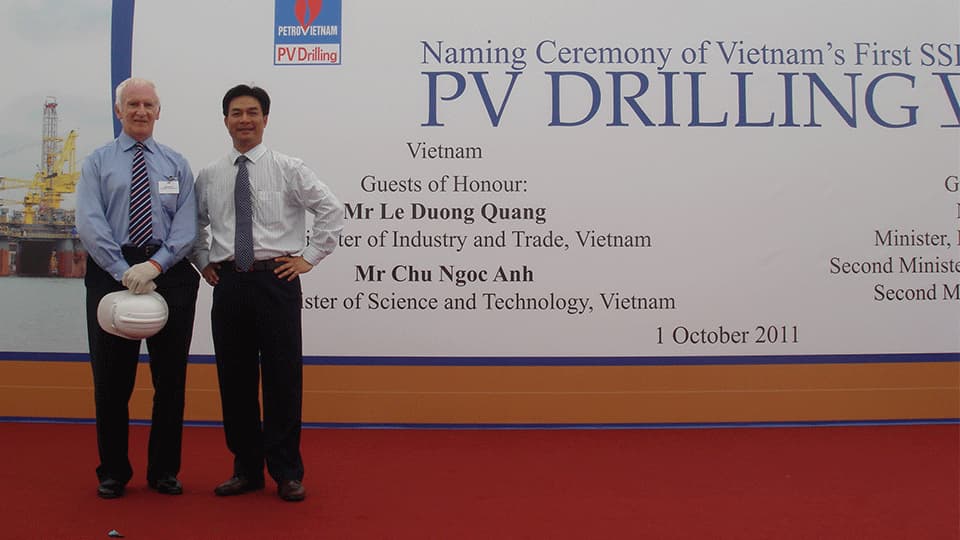John lived in Hazlerigg Hall (before it joined Rutland) for all the three years of his studies, and he was also Hall Secretary. While at Loughborough, John was a member of the Nottingham University Officer Training Corps (OTC) while at Loughborough. He also played rugby, hockey, and Volleyball. John acknowledges the University and stated: “Loughborough gave me a strong foundation for my future career with a high level of teaching by some excellent tutors.”
Since graduating, John has worked in over 50 countries. He has had a varied career working across civil engineering, geology, geotechnical engineering, soil and rock mechanics, seismology, geothermal research and engineering, mining and oil and gas exploration and development.
John’s first job was working in dock, harbour and hydroelectric power station design including port works in the UK, Nigeria, Pakistan, Malaysia and the Dominican Republic. He also worked on a hydroelectric project in Sri Lanka working from an office opposite Westminster Abbey in London under the guidance of Reginald Gwyther, one of the designers of the Mulberry Harbour in WWII. Later, as part of his postgraduate training to qualify as a Chartered Engineer, John was involved in the construction of heavy industrial foundations and motorway bridges in the UK.
This was followed by 14 years managing geotechnical engineering projects related to tunnels, nuclear power stations, dams, harbour works, petrochemical plants, slope stability problems, mining projects and highways. These parts of John’s career took him across the UK and to various countries around the world. He had responsibility for offices in Australia, Philippines, Hong Kong, Ireland and he had major projects in Lebanon, the Fiji Islands, Algeria, Bangladesh, the UAE and Sri Lanka. Working internationally resulted in a long-term interest and knowledge of international affairs.
John took a secondment to Camborne School of Mines (now Exeter University) as Deputy Director for five years. He was involved in research into engineered geothermal systems in basement rocks including deep rock stress and various types of hydraulic stimulation programmes to improve fluid conductivity in rock masses, now known as ‘fracking’.
He has 40 years of experience in the oil and gas industry, managing drilling contractors for oil, gas, and geothermal exploration, gas storage, shale gas exploration, geological research, geoscientific investigations for nuclear waste sites, and mining projects across the UK, Europe, and internationally. His work also included power systems (pumps, power packs, engine overhaul, and lifeboat engines) and offshore wellhead and valve maintenance. John helped establish a joint venture with PetroVietnam, now PV Drilling and Well Services in Southeast Asia.
John added:
“I have always kept in touch with geoscientific projects and was the Project Manager for a Joint Venture of three specialist contractors for a 10-year programme to investigate sites for deep mined repositories for radioactive waste disposal in England and Scotland blending oilfield, geotechnical and mining technologies, which set the standard for these types of investigations.
“I was involved in organising a very deep well in a meteorite impact crater for the Swedish State Power Board (Vattenfall). The well was drilled entirely in granite to almost 7000 m in Central Sweden to investigate the theory of abiogenic or primordial methane advocated by Dr Thomas Gold. I also worked on deep coring methods for the KTB geoscientific super-deep project in Germany originally planned to be drilled to 15 km but finally drilled to only 9 km due to funding issues. Also, involved in deep geothermal wells in crystalline rock at depth in Europe.”
John has also been investigating the concept of deep borehole disposal (DBD) of high-level radioactive waste for government agencies in Sweden, the UK, USA and currently Norway at various times over the last 35 years, an option that is now being seriously considered for disposal of certain wastes such as spent nuclear fuel. Working with a small group at the University of Sheffield, he has written several papers on the DBD concept and been awarded both the George Stephenson and James Watt Medals by the Institution of Civil Engineers.
After retiring in 2007 from a major Canadian drilling company, John helped grow a small Derbyshire-based water well drilling company into an international player in oil, gas, geothermal, and mining. This success earned them a Queen’s Award for Enterprise in 2022.
Finally, John served on the International Association of Drilling Contractors (IADC) Executive Committee and was also as Chairman of the IADC Government Affairs Committee for some years covering global activities with a Staff Officer in Washington DC and represented the IADC on the OGP ‘Gas from Shales Task Force’ in Europe.
John remains a Technical Advisor for the company and he is still involved as a director of the associated consultancy company.
What have you been doing since graduating from Loughborough? Where has your career journey taken you? Share your story with us by emailing the team.
